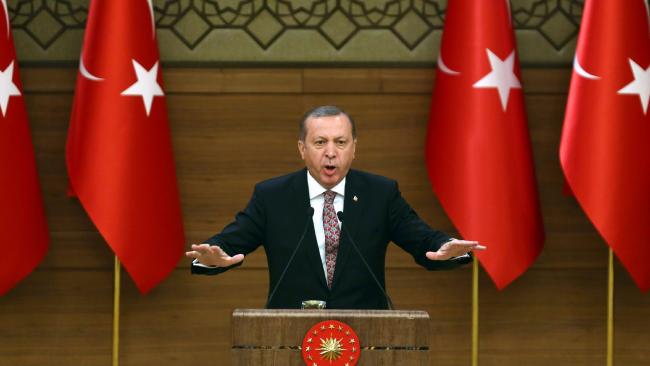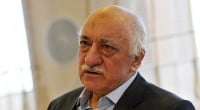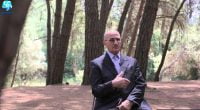Date posted: September 15, 2016
Liz Cookman
President Erdoğan had an opportunity for creating a sense of national unity. His wide-ranging purges have put paid to any idea of that.
It’s been two months since a deadly coup attempt stunned Turkey, leaving some 240 dead and the country reeling. The physical scars are still raw – outside the parliament building in Ankara, which was hit by bombs and gunfire where helicopters fired into a crowd of protesters who had gathered to defend their democracy, the tarmac is still pockmarked with bullet holes. Dark, iron-coloured stains on paving slabs betray the final moments of the brutally slain. Yet the psychological damage, the paranoia and fear that permeate public life, is still being done.
According to the ruling Justice and Development party (AKP) and pro-government media, the unquestionable engineer of the coup was Fethullah Gülen, a secretive US-based Islamic cleric. His followers, known as Gülenists and labelled the Fethullah Terror Organisation (FETÖ) by Ankara, are also accused of having infiltrated the government to establish a “parallel state” that seeks to topple the AKP. The search for anyone affiliated to the group over the last two months has been likened to a McCarthyite witch hunt. Tens of thousands have been detained for questioning or arrested, including soldiers, civil servants, journalists, writers, lawyers and more than 3,000 judges. There have been so many that the prison service, stretched to breaking point, released almost 34,000 prisoners who were jailed before the failed coup in order to free up space.
Gülen is liked by neither secular Turks, nor Islamist AKP supporters. His followers have been blamed for nearly every government mistake or embarrassment since President Recep Tayyip Erdoğan’s inner circle were the subject of a corruption scandal in 2013. Since the coup attempt, the preacher has also been variously accused of owning a Bible, being a “secret cardinal” and working for the CIA.
Over 100,000 people have been purged from positions at government ministries, airlines, schools and universities; and independent business owners have also been targeted. The blanket sackings have been so widespread that many have wondered how the remaining institutions will now run. Some 160 media outlets have been closed and more than 2,000 educational institutions shut down. With a state of emergency declared almost a month ago, there is little to temper the guilty-by-association crackdown.
Gülen is liked by neither secular Turks, nor Islamist AKP supporters. His followers have been blamed for nearly every government mistake or embarrassment since President Recep Tayyip Erdoğan’s inner circle were the subject of a corruption scandal in 2013. Since the coup attempt, the preacher has also been variously accused of owning a Bible, being a “secret cardinal” and working for the CIA, and being in possession of a $1 bill is seen as evidence enough of links to the coup plot – they’re said to denote membership of FETÖ. There has long been a PR battle between Erdoğan and Gülen – one that costs Turkey $50,000 a month for a US attorney to file civil complaints, even before 15 July – but with a formal detention request for Gülen now submitted to the US it remains to be seen who will succeed.
These psychological games played out through unsophisticated propaganda leave Turkey struggling to heal. The official government narrative is everywhere, from the Twitter accounts that appeared in the weeks following the coup, to the dominance of the state-affiliated and pro-government press and TV in the wake of media crackdowns. The same words and phrases have been repeated endlessly by the AKP and their supporters until they become almost meaningless – Get Gülen. Gülen. Gülen. We are democracy. Democracy. Democracy. That is how it is, and there is no room to consider anything else.
Yet despite the hard line on the official story of events, paranoia is still rife. The US and EU have been accused of backing the coup and, on the weirder end of the scale, America was said to have prepared an “earthquake machine” to attack Istanbul after its failure. Positive reinforcement has been dished out to reward the people for stopping the coup through street celebrations – for almost a month people stayed on the streets to protest, encouraged by calls from the minarets of local mosques and text messages from President Erdoğan to protect their country from a follow-up coup. It was part-street party, part-nationalist muscle-flexing. One province even removed speeding penalties during a recent national holiday as a reward; 15 July has been immortalised with a national day; and key points such as Istanbul’s Bosphorus bridge and Ankara’s Kızılay square have been renamed in honour of the resistance.
The official government narrative is everywhere, from the Twitter accounts that appeared in the weeks following the coup, to the dominance of the state-affiliated and pro-government press and TV in the wake of media crackdowns. The same words and phrases have been repeated endlessly by the AKP and their supporters until they become almost meaningless – Get Gülen. Gülen. Gülen. We are democracy. Democracy. Democracy. That is how it is, and there is no room to consider anything else.
Almost universal condemnation of the attempted coup, regardless of political orientation, created an opportunity for national unity. Yet with the purges now spreading to democratically elected mayors, mostly affecting those from the Kurdish People’s Democratic party (HDP) suspected of links to the outlawed Kurdistan Workers’ party (PKK), it has gone far beyond those who may have had a role in the putsch. Opponents who appear to have had little to do with the coup are being punished and divisions deepened in Turkey’s already fractious society. It’s a stain that will likely be seen long after the last traces of the blood has been cleaned from the streets.
Source: The Guardian , September 15, 2016
Tags: Defamation of Hizmet | Democracy | Military coups in Turkey | Turkey |

























